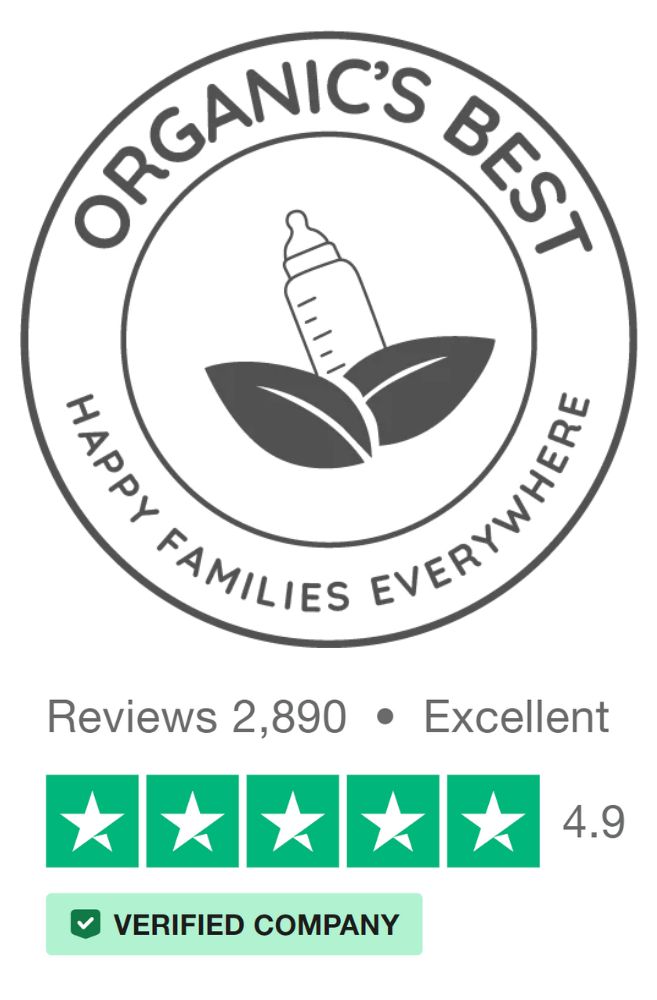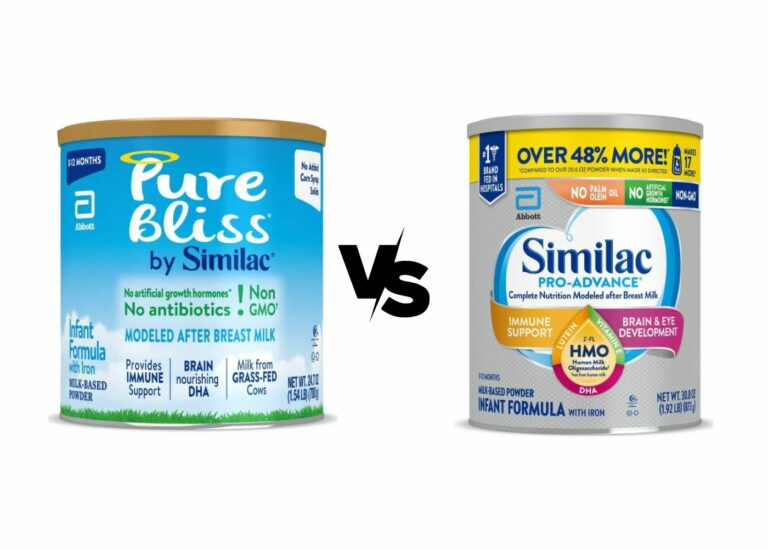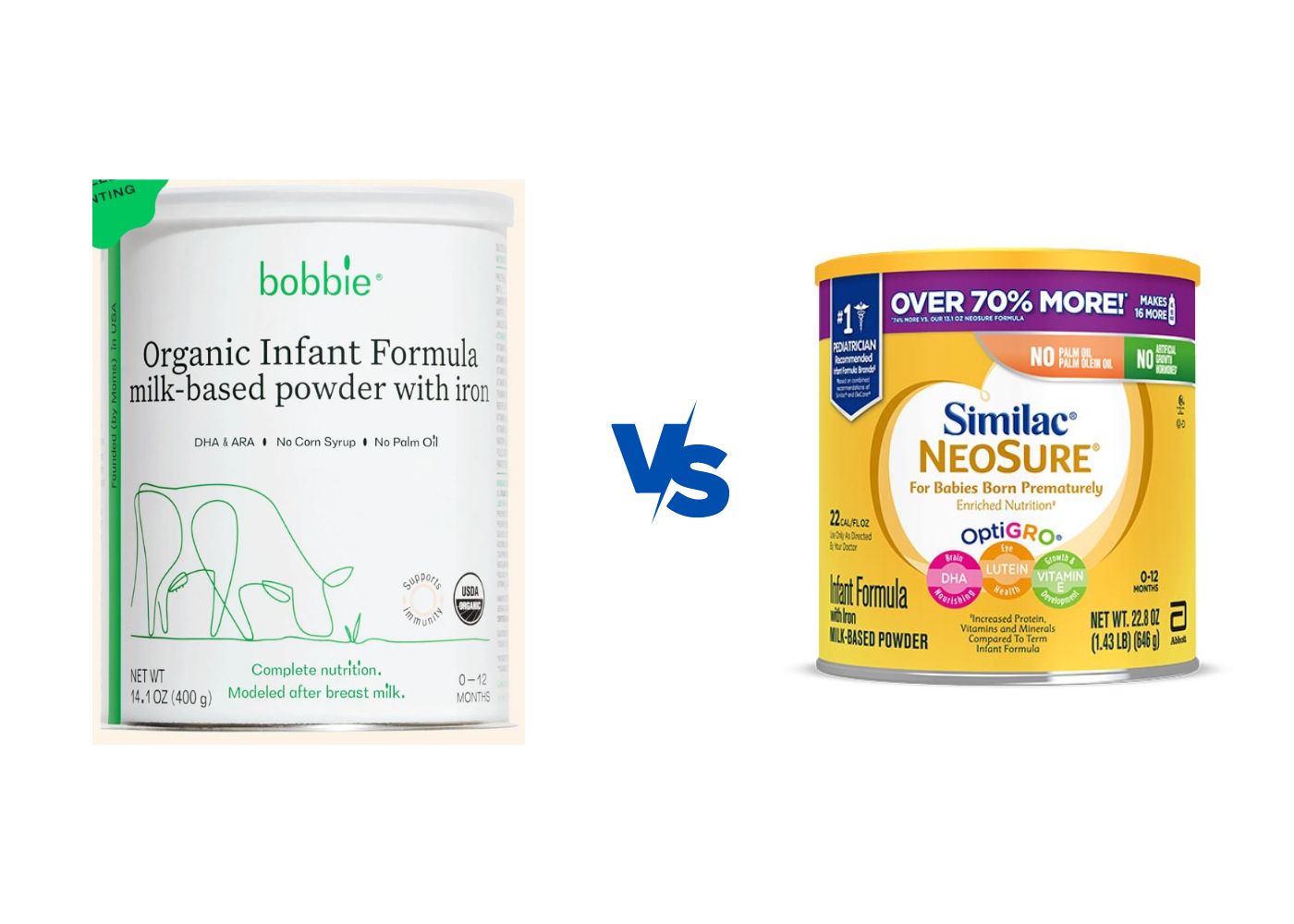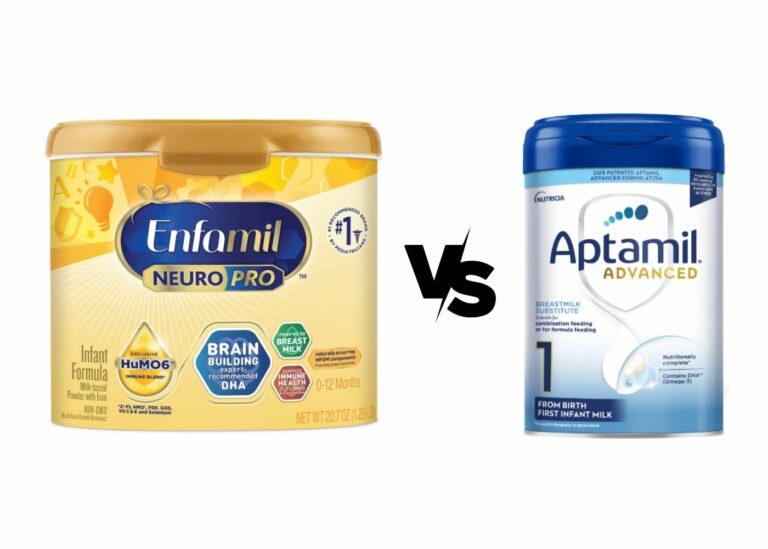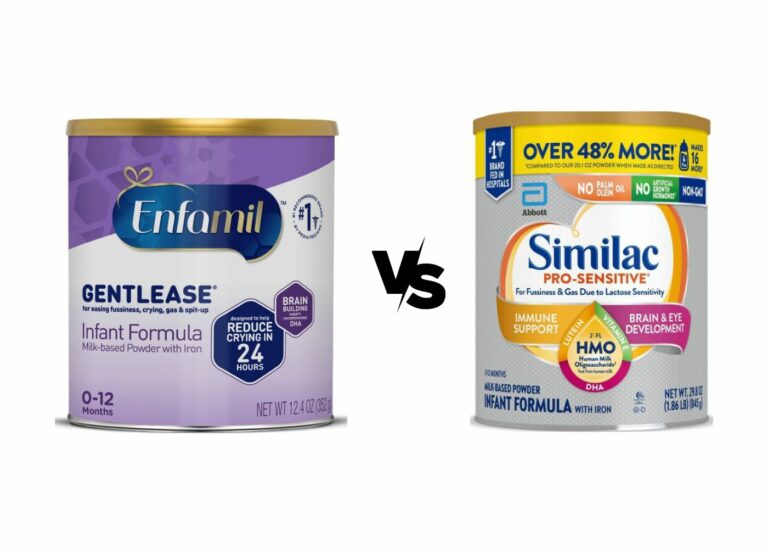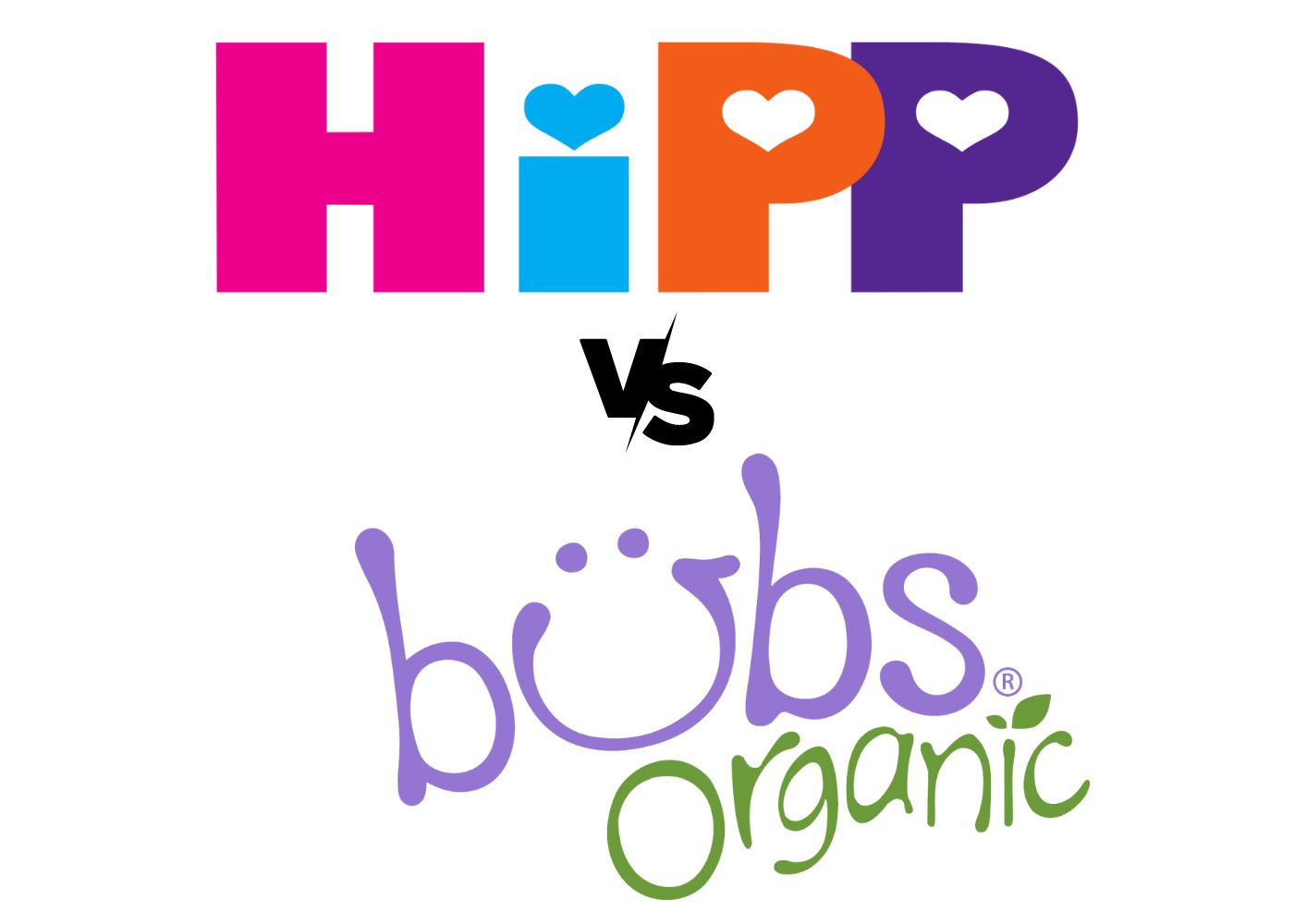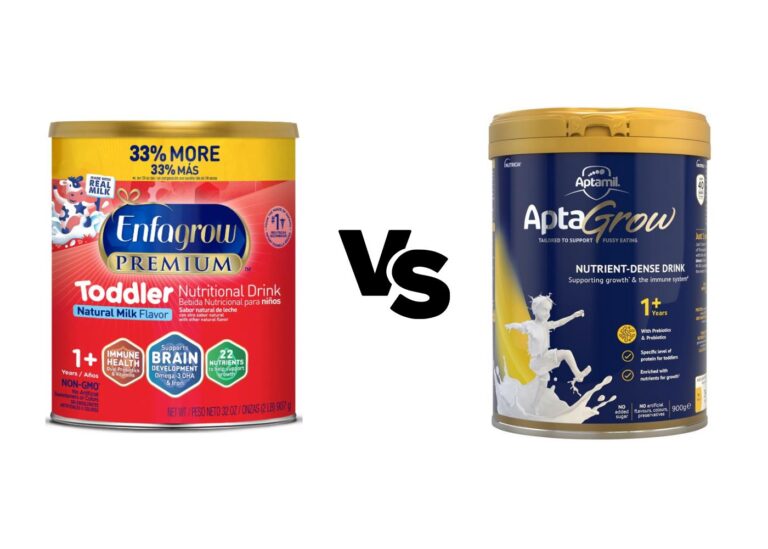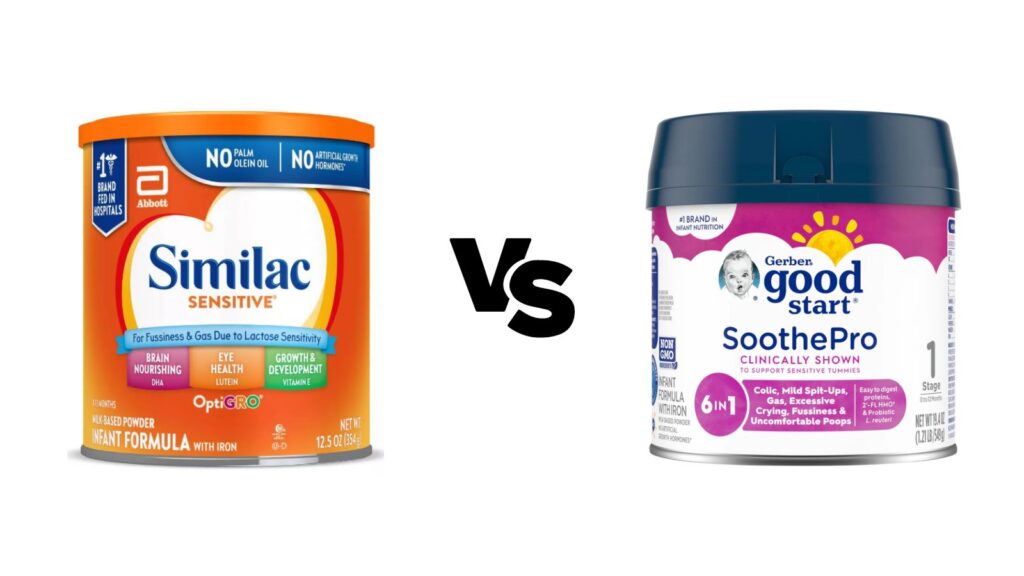
Key Differences Table Between Similac Sensitive and Gerber Soothe
| Features/Aspect | Similac Sensitive | Gerber SoothePro |
|---|---|---|
| Ideal For | Babies with lactose sensitivity | Babies with colic, digestive issues (due to lactose or cow’s milk protein sensitivities) |
| Type | Milk-based formula with reduced lactose | Milk-based formula with hydrolyzed whey protein |
| Primary Protein Source | Nonfat milk and whey protein concentrate | Hydrolyzed whey protein (Comfort Proteins®) |
| Carbohydrate Source | Corn syrup solids | Maltodextrin |
| Fats and Oils | High-oleic safflower, soy, and coconut oil | Palm olein, soy, coconut, high-oleic safflower or sunflower oils |
| Nutritional Profile | OptiGRO (DHA, Lutein, and Vitamin E) | Comfort Proteins®, DHA, probiotics (L. reuteri) |
| Form | Powder and ready-to-feed | Powder and ready-to-feed |
| Ease of Digestion | Designed for lactose sensitivity | Tailored for colic and digestive issues (lactose and cow’s milk protein sensitivities) |
| Specific Benefits | Reduces lactose to ease gas and fussiness | Reduces colic, probiotic for digestive health |
| Prebiotics/Probiotics | Short-Chain Fructooligosaccharides | Contains Lactobacillus reuteri (probiotic) |
This article will compare two popular formulas for sensitive tummies: Similac Sensitive and Gerber SoothePro.
We will analyze their ingredients and composition to help you make the best decision for your baby.
Let’s get after it!
Our Short Answer
After analyzing both formulas, it is clear that both have strengths and weaknesses.
If we had to choose one for our baby, we would choose Gerber Soothe for the following reasons:
- It has partially hydrolyzed protein, which makes it easier to digest.
- It has maltodextrin instead of corn syrup solids, a better alternative to lactose.
- Contains Lactobacillus Reuteri, a probiotic that has been shown to reduce the risk of colic and improve digestion.
That said, we recommend that you learn more about the alternatives below.
With over 100,000 orders delivered globally since 2019, Organic's Best offers clean, safe, and nutritionally rich formulas and snacks.
Free shipping over $100, commitment to freshness and authenticity.
- Express delivery in 2 to 5 business days
- Sourcing from European manufacturers
- Minimum shelf life of 6 months
- Climate-Controlled Warehouse
Give your little one the best start.
CODE 'BLW' for a 5% discount in all orders
Overview of the Two Formulas
Similac Sensitive is designed for lactose sensitivity in infants, reducing lactose to ease gas and fussiness while providing essential nutrients including OptiGRO.
Gerber Soothe, ideal for colic and digestive issues, uses hydrolyzed whey protein and includes Comfort Proteins® and probiotics, with both formulas available in powder and ready-to-feed forms.
Similac Sensitive
Similac Sensitive is a milk-based formula tailored for infants who struggle with lactose sensitivity, resulting in gas and fussiness. It’s important to clarify that lactose sensitivity differs from lactose intolerance, which is rare in infants. Similac Sensitive reduces lactose content, not eliminating it, to help mitigate these symptoms while providing essential nutrients.
- Primary Ingredients: It includes a unique blend of nonfat milk, lactose, and a significant amount of high-oleic safflower oil, soy oil, and coconut oil.
- Nutritional Profile: Packed with OptiGRO, Similac’s exclusive blend of DHA, Lutein, and Vitamin E, which are crucial for eye and brain development.
- Form: Available in powder and ready-to-feed formats, which offers flexibility for parents on the go.
Gerber Soothe
Gerber Soothe (also known as Gerber Good Start Soothe) is formulated for infants who experience feeding problems like colic, excessive crying, fussiness, and gas, often related to milk protein sensitivity or minor digestive issues.
- Primary Ingredients: This formula features hydrolyzed whey protein, which is easier for babies to digest than intact cow’s milk proteins. The oil blend includes palm olein, soy, coconut, and high-oleic safflower or sunflower oils.
- Nutritional Profile: Gerber Soothe includes Comfort Proteins®, small proteins that are easy on your baby’s developing digestive system. It is enriched with probiotics (L. reuteri), clinically shown to reduce crying time in colicky infants.
- Form: Like Similac Sensitive, Gerber Soothe comes in powdered and ready-to-feed varieties to accommodate different parenting needs.
Nutritional Composition
Similac Sensitive uses nonfat milk and whey protein concentrate, suitable for lactose-sensitive infants. Gerber Soothe features hydrolyzed whey proteins (Comfort Proteins®), easier for babies with milk sensitivities.
Sensitive’s main carbohydrate is corn syrup solids, while Soothe uses maltodextrin, a better alternative with less sugar.
Similac Sensitive’s fat blend, without palm olein, is preferable over Gerber Soothe’s inclusion of palm olein, due to concerns about calcium absorption.
Protein Content
Protein is a crucial building block for your baby’s growth, playing a vital role in developing muscles, organs, and the immune system. Let’s compare the protein content and sources in our two formulas:
- Similac Sensitive: This formula uses nonfat milk and whey protein concentrate as primary sources. It’s formulated to reduce lactose, which helps mitigate potential discomfort in lactose-sensitive infants but still provides essential amino acids.
- Gerber Soothe: Gerber Soothe features hydrolyzed whey proteins known as Comfort Proteins®. These proteins are partially broken down, making them easier to digest for babies with developing digestive systems or sensitivities to milk protein.
Both formulas differ quite a bit in their protein sources. Sensitive uses nonfat milk and whey protein concentrate, the most common protein sources in standard formulas.
Soothe however, uses partially hydrolyzed protein, which makes it easier to digest and suitable for babies with cow’s milk protein sensitivities (and are not allergic).
Learn more: Hydrolyzed Baby Formulas | Partially vs Extensively Hydrolyzed Formulas
Carbohydrate Content
Carbohydrates are a vital source of energy for infants and necessary for proper brain development. They also help absorb calcium for strong bones.
- Similac Sensitive: The carbohydrate source in Similac Sensitive is corn syrup solids, the most common alternative to lactose in US-based formulas.
- Gerber Soothe: In Gerber Soothe, corn maltodextrin is the main carbohydrate. The other alternative for lactose sensitive babies.
Science says maltodextrin is better for babies than corn syrup solids. This is because it has less sugar content and it’s easier to digest and process. Corn syrup has been linked to an increase in obesity rates and diabetes.
Learn more: Corn Syrup in Baby Formula | Maltodextrin in Baby Formula
Fats and Oils
Fats are essential in a baby’s diet to support brain development, provide energy, and facilitate the absorption of vitamins. The right mix of fats is crucial for the well-being of your little one.
- Similac Sensitive: The fat blend in Similac Sensitive includes high-oleic safflower, soy, and coconut oil. These sources provide a balanced blend of monounsaturated, polyunsaturated, and saturated fats, suitable for infants needing an alternative to traditional milk fat.
- Gerber Soothe: The oils in Gerber Soothe comprise a mix of palm olein, soy, coconut, and high-oleic safflower or sunflower oils. Palm olein is commonly used in infant formulas but has sparked some debate regarding its potential impact on fat and calcium absorption.
Fat content is where Similac is a better choice than Gerber. This is because Gerber Soothe uses palm olein in its fat blend. While it has its benefits, it has been linked to poor calcium absorption if consumed regularly.
Learn more: Palm Oil in Baby Formula
Prebiotics and Probiotics
In recent years, there has been a growing recognition of the importance of gut health, even in the earliest stages of life. This has led to including probiotics and prebiotics in infant formulas – additives that can be particularly beneficial for babies with sensitive stomachs or those prone to colic and fussiness.
Probiotics are live beneficial bacteria, while prebiotics are food for these bacteria, promoting a healthy gut flora. Let’s explore the specifics of these ingredients in Similac Sensitive and Gerber Soothe.
- Short-Chain Fructooligosaccharides in Similac Sensitive: Short-Chain Fructooligosaccharides (scFOS) are the Similac Sensitive formula prebiotics. These non-digestible carbohydrates encourage the growth of beneficial bacteria in the large intestine, intended to support a healthy digestive system and strengthen the immune defense.
- Lactobacillus Reuteri (DSM 17938) Cultures in Gerber Soothe: Gerber Soothe contains the probiotic Lactobacillus reuteri DSM 17938. Clinically proven to reduce crying time in colicky babies, this beneficial bacteria can help balance the gut microbiome, potentially relieving digestive discomfort.
Best Places to Buy Similac Sensitive and Gerber Soothe


Similac Sensitive
Gerber Soothe
What are the Best Alternatives to Similac Sensitive and Gerber Soothe?
While Similac Sensitive and Gerber Soothe are excellent choices for some families, it’s important to have alternatives that might fit individual dietary needs or preferences better. Here are the best alternative formulas for babies with sensitive tummies:
- Similac 360 Total Care Sensitive: As an alternative to Similac Sensitive, Similac 360 Total Care Sensitive offers a similar formulation but with an enhanced array of human milk oligosaccharides (HMOs), which more closely mimic the immune-nourishing properties of breast milk. *Read: Similac 360 Total Care Sensitive vs Similac Sensitive
- Enfamil NeuroPro Gentlease: This formula is designed to ease gas, fussiness, and crying within 24 hours, with an easy-to-digest protein blend and a rich amount of DHA for brain-building nutrition. *Read: Similac Sensitive vs Enfamil Neuropro Gentlease
- Hipp Comfort: Our favorite, Hipp Comfort, is specifically formulated for babies experiencing digestive issues such as colic, constipation, and gas. It’s renowned for its gentle proteins that are easy to digest, reduced lactose, and a unique blend of prebiotics and probiotics to promote healthy gut flora. *Read: Hipp vs Similac
Last Words
We hope this comparison between Similac Sensitive and Gerber Soothe helps you make a good decision.
If you have any other questions, leave a comment or contact us and we’ll be happy to help.
Happy feeding!
We’re Maria and Alberto, a married couple and educators who are nutrition enthusiasts. Even before we had kids, we were already crazy about nutrition.
We’d read scientific articles, watch videos from nutritionists, and spend hours listening to nutrition podcasts.
Today, we continue doing this, but in a different way, as we’ve learned to sift through the noise and trends. Nutrition, like any other field of knowledge, the more you read and learn, the more you develop a comprehensive understanding of reality, and that’s what has happened to us.
Before having our first child, we focused on learning everything we could about child nutrition, using the same techniques we had already employed, backed by our extensive knowledge in nutrition.
Our mission is to help other parents with their children’s nutrition, to help them become the best versions of themselves.
If we are what we eat and drink, which is absolutely true, let’s do it right!


